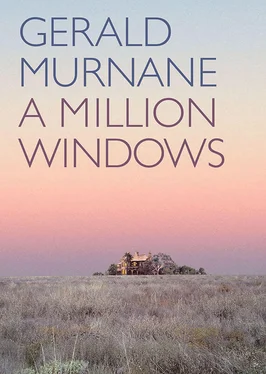He recalls little. He may even have travelled with Darlene on a few more afternoons and talked with her as before, but within a few days he was travelling home alone on a later train. He had simply withdrawn; he had fled; he had run away from her. He doubts whether he felt any shame. For many years afterwards, he could not conceive of any different course available to him, given the sort of person he was at the time. He went on living in the same suburb for four more years. He travelled often by train and shopped often in the adjoining suburb and even went occasionally with his mother or his brother to the Plaza or the Paramount but he always remembered to look out for her in the distance. Sometimes he saw her from far off and loitered or changed direction. If they had suddenly come face to face, he would have dropped his eyes and hurried by.
One of the daily newspapers at that time included a weekly column offering advice to persons with problems, mostly of the sort that might have been called romantic. He read the column sometimes. The persons with problems used pen-names such as ‘Puzzled’ or ‘Confused’ or ‘Heart-broken’ and no detail of their addresses was ever published, not even the name of their suburb or town, so that he thought of them as belonging to an adult society almost as remote as that depicted in films. At some time during the first months after he had ceased to travel with Darlene, he had read the following answer to a questioner. (Not even the actual questions were published — only the columnist’s answers.) ‘What a churlish fellow! Seemingly he did not wish to continue the friendship but lacked the moral courage to say so. Forget about him. You are well rid of him.’
If ever he had asked himself, during all the years since, how a person might feel on seeming to recognise as a version of himself or herself some or another personage in a work of fiction, then he ought to have tried to recall whatever he had felt on learning that a wise and eloquent female person in a tall city building, seated at a desk covered with letters from hundreds of puzzled or confused young female persons, had read a report of certain behaviour of his, and had declared in writing to her many thousands of readers that he was a moral coward who deserved to be forgotten by the young woman who had exchanged glances with him for two years. Sometimes, in later years, he supposed that his having read the answer quoted ought to have shamed and humiliated him; that he ought to have felt as though he had been dragged by uniformed female attendants to the desk of the columnist herself who, dressed in the costume of the Queen Bee or the Empress of the Amazons, had shrieked to his face that he lacked moral courage. He suspects, however, that his main concern was that Darlene had not understood his motives for ending their friendship, as she must have described it.
He must also have been affected by the fact of Darlene’s having written about him. On some or another evening, she had sat with pen and paper and had focused her thoughts on some or another image of him. He must have been thus affected, because the only other details that he recalls from that time are phrases from a letter that he found himself often composing in his mind: a letter that he might have sent to Darlene in order to explain his odd-seeming behaviour and perhaps even to suggest that he and she should become pen-friends for the time being. Perhaps he was dissuaded from writing the letter only by his not knowing Darlene’s address. Few households in the outer suburbs had telephones at that time, and neither his nor Darlene’s parents were listed in the directory. He knew the name of her street, but it was a long street and his only means of learning the number of her house might have been to follow her homeward at a distance as he had tried to follow homeward the first of his dark-haired girlfriends-in-the-mind. Any letter would have had to be sent in care of the columnist, the giver of advice, and she who had urged Darlene to forget him might have refused to pass his letter on.
Did he ever reflect on the folly of the columnist’s telling Darlene to forget him? He was sure that she still remembered him, just as he still remembered her, although it was the silent Dathar that he mostly recalled rather than the talkative Darlene whose words, or almost all of them, had been seemingly lost on him. He never afterwards forgot the dark-haired young woman, hardly more than a girl, who had sat silently in sight of him on many an afternoon for almost two years. He never forgot that she had replied at once and in kind to the only written message he had sent her, although he had misread her reply. A certain version of him had even written, twenty years later, certain pages of fiction about her, and the pages had later been published. If I were to learn that someone, perhaps in this very corridor, is writing still more about her, then it would seem to me as though a certain sort of man might feel compelled to send messages in writing to a certain sort of dark-haired young woman and, when she had not at first sent a message in return, might be compelled to send further messages at intervals of twenty or twice that many years.

Yesterday evening, when I looked along the corridor most likely to lead past the rooms where are conceived and written the fictional texts so often referred to in this present text, I brought to mind still another possible subject fit to be treated by the occupants there, to use a word much favoured by Henry James whenever he came to write about his way of writing.
He who would be best able to treat the possible subject, as I called it, would have spent the last three of his years at school in one or another second-storey classroom with a view of several suburbs in what would be called nowadays the inner south-east of the city where he had been born. The school stood at one end of a long broad valley at the lowest part of which a creek flowed. Whatever might have been the earnings and the bank balances of the families in the suburbs along the valley, he, the possible narrator of what I have in mind, never doubted that all of the families were incomparably better off than was his own family, who lived in a newly settled outer suburb far from the valley. Perhaps half of his classmates lived in the suburbs of the valley, and although many of them were sons of bank-tellers and shipping clerks and lesser public servants, he considered even those families much more fortunate than his own. The tuition fees of the school would be considered modest if converted into the currency of today, but he and his brother incurred no fees — their father had pleaded with the principal when they were first enrolled that he, the father, could not afford even a token fee. He who often looked out across the valley supposed he was the only charity-boy in his class, although he learned many years later that the religious brothers, his teachers, were forbidden by the constitution of their order to turn away any boy whose parents could not pay for his schooling. It would have been prudent of the brothers not to have this known, but he who thought himself the only charity-boy learned also long afterward that he was one of many.
The creek still flows along the floor of the valley, but a freeway, dense with motor-traffic, now occupies what was formerly open space nearby. Local councils had built many football ovals and cricket pitches and a few grandstands and toilet blocks on the land beside the creek. Elsewhere were grasslands or clumps of gorse or bulrushes — places mostly deserted except for a few persons walking dogs or flying model aeroplanes.
On every Wednesday afternoon of the school-year, the senior classes travelled by tram to one or another point low in the valley and then on foot along the creek to one or another oval, there to play football or cricket. He, the chief character of this possible narrative, preferred open grassy places to streets lined with houses but he was seldom at ease beside the creek. He was pleased to stand comparatively alone while fielding at deep mid-on during a cricket match or while he was full-forward for his football team and play was at the other end — he could feel the wind in his face or could hear the goldfinches twittering above the gorse-bushes or even, after the spring rains, the creek rushing between jumbled rocks, but always he could see in the distance the streets after streets of houses where lived the residents of the valley, his supposed betters. From many a sportsground he could see not merely a blur of tiled roofs and green treetops but the details of some or another house, often of two storeys, that was the last house in some or another quiet dead-end street leading from a tree-lined avenue higher up towards the flood-plain of the creek. He who shared with his brother a cramped fibro-cement bungalow in a backyard and who did his homework at a kitchen table could hardly visualise the circumstances of some or another young man, hardly more than a boy, who studied each evening in a room that he alone occupied, at his own desk, and with his own bookshelf nearby and through the window above his desk a view of whole suburbs on the far side of a valley where many a house was of more than one storey and where many an upper window would appear strangely golden when lit by sunlight in the late afternoon.
Читать дальше










